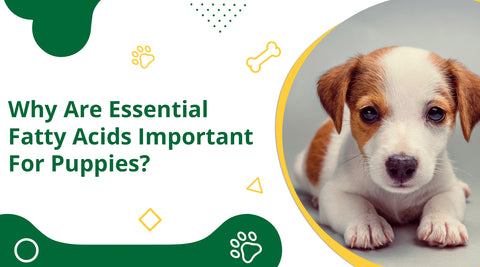
Proper nutrition is essential for the healthy growth and development of puppies. While many pet owners focus on providing their furry companions with the right balance of proteins, carbohydrates, and vitamins, the importance of essential fatty acids is often overlooked. These vital nutrients play a crucial role in ensuring the overall well-being of puppies, and understanding their significance can help you make informed decisions about your pup's diet.
In this blog post, we'll be focusing on a crucial aspect of canine nutrition: essential fatty acids (EFAs). You may have already heard about EFAs if you've done some research on dog nutrition, and the term might sound familiar as it's also relevant to human health.
If you're not familiar with EFAs, don't worry! We'll start by covering the basics before discussing the main topic concerning puppies and EFAs.
While there's plenty of information available about EFAs for adult dogs, what about puppies? Can these young pups also benefit from essential fatty acids, and if so, how can you include them into their diet?
What Are Essential Fatty Acids?
Essential fatty acids (EFAs) are a group of polyunsaturated fatty acids that cannot be synthesized by the body and must be obtained through diet. The two primary types of EFAs are omega-3 and omega-6 fatty acids, both of which are essential for various bodily functions.
Omega-3 fatty acids, such as alpha-linolenic acid (ALA), eicosapentaenoic acid (EPA), and docosahexaenoic acid (DHA), are known for their anti-inflammatory properties and are crucial for brain and eye development, as well as cardiovascular health.
Omega-6 fatty acids, like linoleic acid (LA), play a role in skin and coat health, immune function, and maintaining healthy bone and muscle development.

Why Are Essential Fatty Acids Important for Puppies?
Essential fatty acids are particularly crucial for puppies during their rapid growth and development phase. Here are some key reasons why EFAs are essential for your furry friend's well-being:
- Cognitive Development: Omega-3 fatty acids, especially DHA, are essential for proper brain development and cognitive function in puppies. They support the formation and function of neural pathways, contributing to learning abilities and memory.
- Skin and Coat Health: Both omega-3 and omega-6 fatty acids play a vital role in maintaining healthy skin and a shiny, lustrous coat. They help regulate the skin's natural oil production, preventing dryness, itching, and excessive shedding.
- Joint Health: EFAs have anti-inflammatory properties that can help reduce joint inflammation and support overall joint health. This is particularly important for puppies as they grow and their skeletal system develops.
- Immune Function: Essential fatty acids contribute to a strong immune system by regulating inflammatory responses and supporting the production of immune cells.
- Energy Metabolism: EFAs are involved in energy production and utilization, ensuring that puppies have the necessary fuel for their high energy demands during growth and play.
How to Provide Essential Fatty Acids to Puppies
Ensuring your puppy receives an adequate supply of essential fatty acids can be achieved through a well-balanced diet. Here are some options to consider:
- Puppy Food: High-quality puppy foods are formulated to include the appropriate levels of essential fatty acids required for growth and development. Look for puppy foods that contain sources of omega-3 and omega-6 fatty acids, such as fish oils, flaxseed, or plant-based oils.
- Fatty Fish: Incorporating fatty fish like salmon, mackerel, or sardines into your puppy's diet can provide a rich source of omega-3 fatty acids, particularly EPA and DHA.
- Supplements: If your puppy's diet is lacking in essential fatty acids, consider adding a high-quality supplement. Fish oil supplements are a popular choice, but plant-based options like flaxseed oil or evening primrose oil can also be beneficial.
How Can Camelina Gold Help?
Camelina Gold Oil is a unique and highly nutritious oil that offers a remarkable balance of essential fatty acids, making it an excellent choice for supporting your puppy's overall well-being.
Camelina Gold Oil contains an almost perfect ratio of 2:1:2 of omega-3, omega-6, and omega-9 essential fatty acids. This balanced blend ensures that your puppy receives the necessary amounts of each fatty acid without an excess or deficiency of any one type.
Additionally, Camelina Oil is exceptionally high in vitamin E, including alpha-tocopherol, beta-tocopherol, and gamma-tocopherol. Vitamin E is a powerful natural antioxidant that not only supports a healthy immune system but also contributes to the extended shelf life of 18 months for Camelina Oil.
By incorporating Camelina Gold Oil into your puppy's diet, you can provide them with a comprehensive source of essential fatty acids, antioxidants, and other beneficial nutrients, supporting their growth, development, and overall health.
Conclusion
By understanding the importance of essential fatty acids and providing your puppy with a balanced diet rich in these vital nutrients, you can support their overall growth, development, and long-term health. Remember, proper nutrition during the critical puppy stage sets the foundation for a happy and healthy adult dog.
FAQs:
Is essential fatty acid good for dogs?
Absolutely! Essential fatty acids are vital for dogs of all ages, including puppies. They support various bodily functions, such as skin and coat health, cognitive development, joint health, and immune function.
What are good fatty foods for puppies?
Some good fatty food options for puppies include fatty fish like salmon, mackerel, or sardines, as well as plant-based sources like flaxseed, chia seeds, and camelina oil. It's important to provide these foods in moderation and as part of a well-balanced diet.
Why do puppies need fats?
Puppies require fats for several reasons, including energy production, proper brain and eye development, maintaining healthy skin and coat, supporting joint health, and ensuring proper immune function. Fats also aid in the absorption of fat-soluble vitamins like A, D, E, and K.




